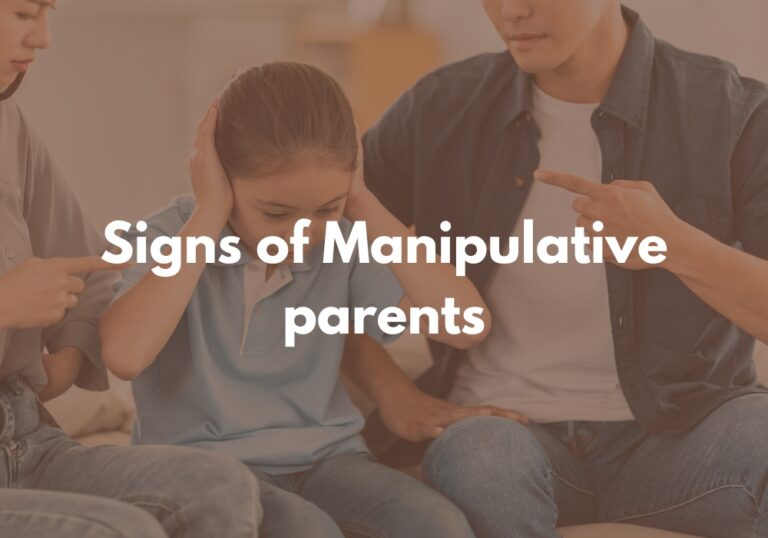What happens when your home, meant to be a place of safety and comfort, becomes a source of pain and stress? This is what people in toxic families experience. In these families, interactions harm your emotional, mental, or physical well-being.
Instead of feeling loved and supported, you face constant criticism, manipulation, and conflict.
Understanding the signs of a toxic family is the first step to protecting your mental health and finding peace. So, let’s look at what makes a family toxic and explore ways to cope.
Understanding Toxic Family Dynamics:
Toxic family dynamics can feel like being stuck in a constant loop of drama and chaos. This leaves you feeling trapped in misery. Understanding the common traits, root causes, and patterns of dysfunction in toxic families can help you make sense of why these problems persist.
8 Common Signs of a Toxic Family:
1-Lack of support:
In toxic families, emotional support is often missing. Achievements aren’t celebrated, and struggles are ignored or met with criticism instead of encouragement. This lack of support makes it hard for people to reach their goals and feel valued within their families.
“Without encouragement, individuals may struggle with self-esteem and a sense of belonging.”
2-Lack of Boundaries:
In a toxic family, boundaries are often crossed, causing feelings of intrusion and disrespect. Personal space and privacy are frequently ignored, leading to a lack of autonomy for individual family members.
3-Constant Criticism:
Instead of offering helpful feedback, toxic family members focus on faults and mistakes. They might belittle, mock, or shame one another, causing a negative self-image and making everyone feel bad about themselves.
4-Control Issues:
Control issues are a big problem in toxic families. Some members try to control others, making all the decisions and limiting their freedom. This constant control stifles autonomy and can prevent individuals from developing their own sense of self and confidence.
5-Emotional neglect:
Emotional neglect is a common sign of a toxic family. In these families, feelings and needs are often ignored. This lack of care can make you feel lonely, isolated, and unloved.
6-Manipulation:
Manipulation is another common sign in toxic families. Members often use guilt, fear, or pressure to get what they want. This can make others feel powerless and resentful.
Related:18 Signs of Manipulative People
7-Verbal or Physical Abuse:
Verbal or physical abuse is also a big sign of a toxic family. whether the mean words can hurt your feelings deeply or physical violence leaves scars, both of these behaviors break trust and make the family feel unsafe.
8-How They Make You Feel:
Another common sign of a toxic family is how you feel around them. You might feel depressed, anxious, or like you’re walking on eggshells. These feelings can include low self-esteem, helplessness, and irritability. If you constantly feel this way around a family member(s) or before seeing them, it indicates they are a toxic family member(s).
14 Strategies for Coping with a Toxic Family Environment:
When you’re stuck in a toxic family situation, it’s important to have ways to cope.
There are strategies you can use to navigate through the challenges of a toxic family environment.
1-Recognizing Toxic Behavior:
The first step in dealing with a toxic family environment is recognizing unhealthy signs. This could be things like manipulation, constant criticism, not respecting your boundaries, saying hurtful things, or even being physically aggressive. Knowing these signs helps you understand that these behaviors are not okay.
Remember, it is important to be treated with respect and kindness, regardless of the circumstances. It’s important to know that a family member’s toxic behavior isn’t about you—it’s about their own issues. Understanding this can help you set boundaries, get support from people you trust, and take care of your feelings. Recognizing these things enables you to handle tough family situations better.
2-Set Boundaries:
Creating boundaries is essential, even though it’s easier said than done.
Figuring out how to set boundaries can take time, especially if your family has few or no boundaries. Toxic people dislike boundaries because it makes controlling you harder. They thrive on invading your personal space and doing whatever they want. By setting boundaries, you limit their ability to behave this way.
So, Communicate your boundaries clearly and stick to them, as well as those that are unacceptable to you.
It’s okay to say no to unreasonable demands, and arguments, and put your well-being first.
“Remember, you have the right to set boundaries that protect your mental and emotional health.”
3-Limit Contact:
Sometimes, minimizing your interactions with toxic family members can be crucial for maintaining your mental well-being. This approach gives you the space to recover from any negative impact and focus on nurturing positive relationships in your life. Limiting contact doesn’t have to mean completely cutting ties; it’s about finding a healthy balance that works for you. It allows you to prioritize your emotional health while still managing relationships that are important to you, albeit with clear boundaries in place.
This approach can empower you to create a more supportive and healthier environment for yourself.
4-Learn When to Say No:
Learning to say no is important for setting boundaries and protecting yourself from toxic behavior. Saying no to family members can be hard, and they might not take it well. However, if you know a situation will make you unhappy or uncomfortable, saying no is the best option. You are not obliged to explain, although you can do so if you wish. Toxic family members might try to change your mind, but trust in your decision.
Family members who truly love and support you will respect your need for boundaries.
Related:7 Tips for Saying No Effectively
5-Building a Support System:
Seeking support from friends, therapists, support groups, or helplines can provide valuable emotional support and guidance when dealing with a toxic family situation.
Connecting with people who understand your experience can validate your feelings and provide practical advice on how to cope.
Remember that you are not alone, you do not have to face this alone, and there are people who can help you during this difficult time.
6-Don’t Engage:
It’s crucial not to engage in provocative or argumentative interactions. It can be difficult to stay silent when someone says or does outrageous things, but it’s essential for your own well-being. Remember that anything you say might be used against you and won’t change their mind.
“Toxic people try to control and break you down so they can manipulate you more easily. By not engaging, you protect your sanity and maintain your power.”
7-Fostering Positive Connections and Friendships:
Build friendships that bring joy and fulfillment to your life. Invest time and energy in relationships that are built on mutual respect and care. Surround yourself with people who support and uplift you, and who appreciate you for who you are. These positive connections can provide a strong support system, helping you to feel valued and loved.
Related: How To Maintain Lasting and Strong Friendships: 10 Tips
8-Practicing Self-Care and Self-Compassion:
While dealing with toxic family dynamics, remember to prioritize your own well-being and show yourself the love and compassion you deserve. Make self-care a non-negotiable part of your routine by engaging in activities that nourish your mind, body, and soul, such as exercise, meditation, journaling, or hobbies.
Be kind to yourself, especially when facing the challenges of a toxic family. Treat yourself with the same kindness and empathy you would give a friend in need. Seeking support from trusted individuals or professionals can also provide valuable guidance and comfort.
9-Be Positive:
Toxic people are often very critical and negative, which can drain your energy. If this happens, whenever a toxic family member criticizes or becomes negative, change the subject. Talk about fun things and always highlight the positive side of something. If you keep doing this, over time, the person will realize that you are no longer playing their game.
10-Stay Grounded:
Keep a grounded perspective and don’t let toxic behavior make you doubt your worth or values. Always remind yourself of your strengths and positive qualities. Staying grounded helps you maintain confidence and resilience.
“Staying grounded means knowing your own value and not letting anyone else decide it for you.”
Related: Improving Your Confidence with 15 Easy Tips
11-Set Realistic Expectations:
Understand that you cannot change others, and set realistic expectations for your family members’ behavior. Accept them as they are while protecting yourself. This can help reduce frustration and disappointment. Recognize their limitations and understand that they may not meet your needs or expectations. This doesn’t mean you approve of their behavior, but it helps you focus on what you can control—your reactions and boundaries. By doing this, you can better manage your emotions and avoid unnecessary stress.
12-Maintain Independence:
It’s crucial to keep your personal and professional life separate from toxic family dynamics to maintain your sense of self. By nurturing your independence, you preserve your identity and well-being.
Having hobbies, friendships, and activities outside of the family sphere provides a healthy balance and emotional support. This separation allows you to remain grounded and resilient, even when faced with challenging family situations.
It also empowers you to set boundaries and prioritize your own happiness and fulfillment.
13-Educate Yourself:
Learning about toxic behavior and its effects is empowering. Understanding why people behave toxically can give you insights and help you figure out ways to cope. It also reinforces that you are not to blame for others’ toxic actions.
This knowledge helps you handle difficult family situations better, so you can protect yourself and set boundaries that keep you safe and happy.
14-Seek Professional Help:
Last but not least, sometimes coping mechanisms and support systems alone may not be enough to handle toxic family members. In such cases, seeking help from a licensed therapist can be beneficial.
Therapists can provide tools and resources to manage your emotions and navigate tough relationships. Through therapy, you can develop coping strategies, build resilience, and identify harmful behavior patterns.
A therapist can also guide you in setting boundaries and improving communication with toxic family members.
Conclusion:
All families have problems.
So, dealing with a toxic family is never easy, but you’re not alone. Remember, you deserve respect and kindness, even from your family. Focus on your mental health and take steps to create a better environment for yourself.









It’s tough when you’re stuck in a toxic environment, but we all go through it at some point. Having a few simple tips to deal with it can really help make things a bit easier